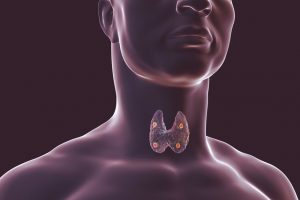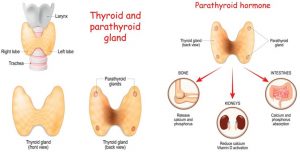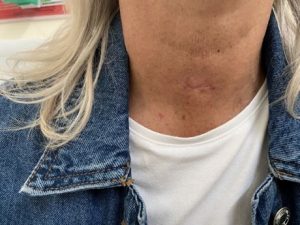Mr Ali Al-lami, Consultant ENT/ Head and neck surgeon at One Ashford Hospital gives an insight into the parathyroid glands, their function and their common disorders.
What are parathyroid glands?
The parathyroid glands are the smallest endocrine (hormone producing) glands in the body. They are located in the neck next to another endocrine gland called the thyroid gland and hence their name. You usually have 4 parathyroid glands on either side of the midline of the neck, although their location can vary. Their normal size is 3-5 mm in diameter and weigh 30-60 milligrams. They produce a hormone called parathyroid hormone. This hormone controls the body calcium levels through its action on the bones, kidneys and intestine. You need calcium for bone metabolism, nerves to work properly, the heart to function properly as well as other important functions.
Figure 1:
Location of the parathyroid glands (yellow colour) next to the thyroid gland (grey colour) in the neck.
Figure 2:
Location of the parathyroid glands and the effects of the hormone they produce.
What is a parathyroid grand disorder?
Parathyroid gland disorders usually result in parathyroid enlargement causing high parathyroid levels (hyperparathyroidism) and commonly high calcium levels (but not always). They can be classified as primary hyperparathyroidism arising from one or more of the parathyroid glands themselves, or secondary or tertiary hyperparathyroidism due to kidney problems.
Common ways of identifying parathyroid glands dysfunction is through identifying a high calcium level on a routine blood test. However, other common presenting symptoms that our patients present to their doctors with include fatigue, memory problems, abdominal pains, excessive urination, kidney stones, eye cataract, muscle and bone pain and bone fractures as a consequence of bone protein and minerals reduction (osteopenia and osteoporosis). Investigations are usually done via a blood test first and a urine test.
Radiological investigations in the form of nuclear medicine scan to confirm the hyperfunctioning parathyroid gland. An ultrasound is also recommended to corroborate the nuclear medicine scan. An ENT surgeon usually checks the function of your vocal cords with a camera inserted through your nose before and after an operation of your parathyroid glands.
How do you treat parathyroid disease?
A parathyroidectomy surgery could be offered depending on the cause of the hyperparathyroidism. A single localised parathyroid adenoma is usually a quick operation of around 30 minutes operating time. If there is more than one enlarged gland suspected, central neck exploration (or synonymously called 4 glands exploration) could be carried out and this could take up to 2 hours operating time. These are usually carried out through a small incision in the centre of the neck.
Figure 3:
A patient scar 6 weeks after undergoing a parathyroidectomy for a single parathyroid adenoma (the four glands exploration scar is larger).
As with any operation, there are risks, these include bleeding, infection, scarring, inability to localise the rogue parathyroid gland, voice change due to temporary or permanent vocal cord weakness or paralysis due to damage to the local nerves. Extremely rarely low calcium levels can happen after a parathyroidectomy and this can be treated but may mean longer stay in hospital. A small surgical drain could be inserted in your neck for a few hours to collect any fluid build-up in your neck and this is removed before you go home. Blood tests are usually carried out soon after the operation and in the outpatient settings to check your parathyroid and calcium levels. Commonly patients stay overnight in hospital. The normal advice is to allow recovery period for up to 2 weeks.







 One Ashford
One Ashford One Hatfield
One Hatfield